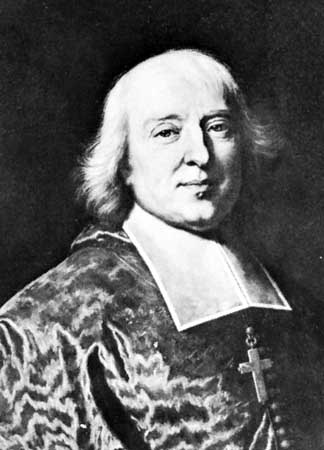divine right of kings
doctrine
doctrine in defense of monarchical absolutism, which asserted that kings derived their authority from God and could not therefore be held accountable for their actions by any earthly authority such as a Parliament. Originating in Europe, the divine-right theory can be traced to the medieval conception of God's award of temporal power to the political ruler, paralleling the award of spiritual power to the church. By the 16th and 17th centuries, however, the new national monarchs were asserting their authority in matters of both church and state. King James I of England (reigned 1603–25) was the foremost exponent of the divine right of kings, but the doctrine virtually disappeared from English politics after the Glorious Revolution (1688–89). In the late 17th and the 18th centuries, kings such as Louis XIV (1643–1715) of France continued to profit from the divine-right theory, even though many of them no longer had any truly religious belief in it. The American Revolution (1775–83), the French Revolution (1789), and the Napoleonic wars (French revolutionary and Napoleonic wars) deprived the doctrine of most of its remaining credibility.
 The bishop Jacques-Bénigne Bossuet (Bossuet, Jacques-Bénigne) (1627–1704), one of the principal French theorists of divine right, asserted that the king's person and authority were sacred; that his power was modeled on that of a father's and was absolute, deriving from God; and that he was governed by reason (i.e., custom and precedent). In the middle of the 17th century, the English Royalist squire Sir Robert Filmer (Filmer, Sir Robert) likewise held that the state was a family and that the king was a father, but he claimed, in an interpretation of Scripture, that Adam was the first king and that Charles I (reigned 1625–49) ruled England as Adam's eldest heir. The antiabsolutist philosopher John Locke (Locke, John) (1632–1704) wrote his First Treatise of Civil Government (1689) in order to refute such arguments.
The bishop Jacques-Bénigne Bossuet (Bossuet, Jacques-Bénigne) (1627–1704), one of the principal French theorists of divine right, asserted that the king's person and authority were sacred; that his power was modeled on that of a father's and was absolute, deriving from God; and that he was governed by reason (i.e., custom and precedent). In the middle of the 17th century, the English Royalist squire Sir Robert Filmer (Filmer, Sir Robert) likewise held that the state was a family and that the king was a father, but he claimed, in an interpretation of Scripture, that Adam was the first king and that Charles I (reigned 1625–49) ruled England as Adam's eldest heir. The antiabsolutist philosopher John Locke (Locke, John) (1632–1704) wrote his First Treatise of Civil Government (1689) in order to refute such arguments.The doctrine of divine right can be dangerous for both church and state. For the state it suggests that secular authority is conferred, and can therefore be removed, by the church, and for the church it implies that kings have a direct relationship to God and may therefore dictate to ecclesiastical rulers.
- Joseph Arch
- Joseph-Arthur, comte de Gobineau
- Joseph-Arthur Gobineau, comte de
- Joseph A. Schumpeter
- Joseph Augustine Cushman
- Joseph Auslander
- Joseph, Baron Fourier
- Joseph, Baron Günzburg
- Joseph Barrell
- Joseph Benedict Chifley
- Joseph ben Ephraim Karo
- Joseph ben Shem Tov ibn Shem Tov
- Joseph Bertrand
- Joseph Beuys
- Joseph Black
- Joseph Blackburn
- Joseph Blanco White
- Joseph Bodin de Boismortier
- Joseph Bonaparte
- Joseph Bonaparte Gulf
- Joseph Bramah
- Joseph Brant
- Joseph Brodsky
- Joseph B Strauss
- Joseph Butler